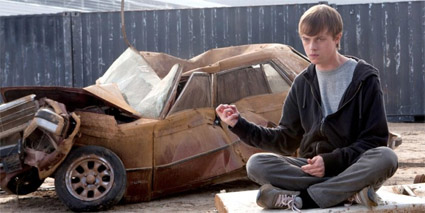
Josh Trank's "Chronicle" is the kind of film that curious teenage boys dedicate their hopes and dreams to, before succumbing to thoughts about health insurance and car payments. It advertises itself as a small movie about a few giggling, frowning high schoolers. The movie starts out as a curious plastic toy. Along the way, however, it carefully reveals itself as a colossal amusement park of screams and shouts. Don't let anyone spoil this movie for you, because it is the cult film of its generation.
I remember that cranky old man across the street who sat all day on his cranky metal lawn chair, staring at his landscaping. He would take breaks from his meditative trance to yell at me as my runaway basketball would bounce along, crashing joyously onto his manicured greenery. Thinking about him now, I wonder when the curious teenage boy within us gets replaced by the dark-eyed curmudgeon? At what point does the aspiring Jedi get beaten down and overtaken by a loss of ideals?
According to Trank and his co-writer Max Landis, the young male faces seven tyrannies. For the growing young man, these tyrannies force conformity. For the imagination, these tyrannies crush hope, and replace it with obedience. If the young man can escape them, he will achieve freedom, manhood. If not, he will collapse into the unfurnished basement of dreams, spending his time in front of a television, escaping instead into the punishing elixir of booze and noisy reality shows, while beating the ambitions out of his own son.
The first tyranny provides the heart of the movie. It is the tyranny of physics. The joy of "Chronicle" is the same joy that so many sci-fi movies hold, that our hero (or in this case anti-hero) finds a way to bypass the bounds of physics. While most such physics-defying movies you can think of compel or support heroes to serve society, this movie is very much the opposite. Here, we watch scrawny Andrew Detmer, played by Dane DeHaan with unkempt hair like a greasy Luke Skywalker, circa "Return of the Jedi." He looks like Leonardo DiCaprio with Andy Serkis' eyes, and Gollum's bursting, restrained rage. Andrew Detmer and his friends have found a way to affect physics, but they use it to explore and "get high," but never to save.

The second tyranny is the tyranny of Communication. Each of us has an innate need to interact. In the common teenager's world today, we have our alternative identities in social media, writing our biographies by way of emotive photos and quixotic status messages. In the film, however, Andrew has a video camera that allows us to receive and respond. It is his shield against the world, which only sometimes protects him.

On a side note, the whole film is a case study of the camera. Our main character speaks through and to his camera. We witness the progression of events through multiple types of cameras (including security cameras, television cameras, and home video cameras). The camera itself is often a tool of the fascist state to monitor the citizens, while at the same time it is a tool of the powerless, chronicling the tyrannies of the state. Today, we watch soon-to-be-martyred journalists videotaping the atrocities of the Syrian government against its people while we also watch young people sharing their stories through video blogs.
The third tyranny is the tyranny of Family. I am often in the position of counseling people, and again and again I discover that the biggest force that dissolves ideals and beliefs out of young people is a parent that is either absent or tyrannical. The child seeks nurturing, and when that fails, validation from the parent. The absent parent fails to provide the cultivation the child needs, while the tyrannical parent destroys the child's sense of self. In "Chronicle" we have both, by way of a terminally ill mother who does try to grasp at sufficient energy to empower her child, and a father whose own powerlessness - as a drunk, surviving on disability payments - gets expressed through his violence. We see in the film that powerlessness begets a violence that tears down those who were begotten.

The fourth tyranny is the tyranny of High School. We all know the tyrannies of the high school universe, with its concrete edifice, its plain artwork, its officers, its bullies, and its intense social pressures. Here, we find many students escape from the daytime tyranny of high school into the night time enjoyment in even more daunting concrete buildings hosting rave parties. But, it is even in one of these rave parties that Andrew is unable to find escape, for the oppression of the social day haunts him into his social night: he gets beaten because of his camera (again).
The fifth tyranny is the tyranny of the State. The young man might be able to break past his family. He might graduate through high school (and college, for that matter). But, then he has to face the strictures of the state. So many movies chronicle the oppressive experience of high school, while so many rap, country and folk songs chronicle the crushing dehumanization of the state. The state actors in this film are largely anonymous, uniform cops in uniform cop cars. We know they are humans, just like our central characters, but in meaning, they become censors against expression.

The sixth tyranny is more difficult to escape. It is the tyranny of the Body. Each time our characters develop new skills, their bodies begin to suffer: they are not immune to the frailties of the flesh. Their diets of product-sponsored soft drinks and fast food do not help. The only way they can protect themselves from the elements is by dressing in warm clothing and, when possible, by using their superpowers to block attacks. Otherwise, they are just as vulnerable as Icarus on a rainy Seattle day. Their noses bleed. They get sore. They vomit under stress.


The seventh tyranny is the most difficult to escape. It is the most classical of tyrannies, being the stuff of all the great tragedies. Likewise, it fuels the greatness of this film. It is, of course, the tyranny of the Self. "Chronicle" is not so much a film about a group of young men fighting their bodies, or the state, or high school, or their families, or communication, or physics. More than that, it is about young men navigating the gigantic world around them, using the few skills they have within themselves. Common among them is curiosity, and that takes use through the first movements in the film. Beyond that, one - Class President Steve (Michael B. Jordan) - navigates using his innate, caring charm. Another, cousin Alex (Matt Garetty), interprets through the world by replacing empathy with philosophy and family loyalty. And, our central character is a frail Andrew battling the world by grasping for power. He has nothing else but a powerlessness that is frequently abused, so for him, the world becomes increasingly a playground for his attempts to roar. But, even more than that, "Chronicle" is the story of a young man full of hatred for his environment, his circumstance, and his Self. So, he responds passively, then passive aggressively, then aggressively.


While watching this movie, I felt as though I was watching a science fiction psychoanalysis of a school shooter. But, perhaps, this movie is essentially the story of the ninety percent of awkward high school boys who do not join clubs, go to dances or watch football games, but really wish someone invited them to do so. Until then, they watch movies like "Chronicle" for it gives them hope and meaning.
Omer M. Mozaffar teaches at Loyola University Chicago, where he is the Muslim Chaplain, teaching courses in Theology and Literature. He has given thousands of talks on Islam since 9/11. He is also a Hollywood Technical Consultant for productions on matters related to Islam, Arabs, South Asians.




